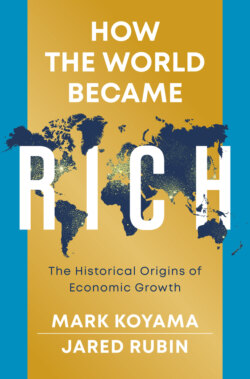Читать книгу How the World Became Rich - Mark Koyama - Страница 10
Preface
ОглавлениеThe world is rich, although it may not always seem like it. Poverty is still all too prevalent. Approximately one billion people around the world barely have enough to survive. The fate of millions of people living in poverty and violence in places like Venezuela, Syria, Burundi, or the Democratic Republic of Congo is deplorable. Even in the developed world, poverty is far, far too common.
Yet, by historical standards, the world is very rich. Most people are much better off than their ancestors were. In fact, most people living right now are better off than almost every person who ever lived prior to two centuries ago (save a very small fraction of elites who lived in luxury … or what was considered luxury at the time). As the world has become richer in the 20th and 21st centuries, more and more people have been lifted out of poverty. And there is good reason to hope that, within our lifetimes, a significant fraction of the remaining poverty around the world will be eliminated.
How did the world become rich? This is the question this book attempts to answer. It is by no means easy to do so. In fact, there is almost certainly no one correct answer! Yet, it remains perhaps the biggest question in the social sciences. A proper understanding of why certain parts of the world have become rich – and others have not (yet) – can help us tackle some of the biggest problems facing us in the present. As you read this book, it will soon become clear that there is no panacea to lift a country into riches. However, there are many factors that historically tend to be present alongside sustained economic growth. It is our goal to both highlight these factors and provide insight into when they do and do not contribute to growth.
Throughout this book, we draw on an immense and fast-growing scholarship in global economic history. The first half of our book is mostly meant to be an overview of what we consider to be the leading theories for how the world became rich. Our debts to this scholarship are evident throughout. Naturally, as this book is addressed to a broad audience, we have not been able to cite every piece of specialist research. We apologize in advance for any omissions. We do, however, direct the reader towards the relevant literature wherever possible.
Many people helped us along the way. We cannot possibly thank everyone without this Preface taking up half the book. Sascha Becker, Desiree Desierto, Anton Howes, Nathan Nunn, Tuan-Hwee Sng, Felipe Valencia Caicedo, and John Wallis read parts (or all!) of the book. Their insightful comments helped us significantly improve the manuscript. Our editor at Polity, George Owers, gave excellent guidance at each step of the process. Dan Bogart, Dave Donaldson, Erik Hornung, Noel Johnson, and Jonathan Schulz shared their data files so that we could produce some of the figures in this book. Mark thanks his many coauthors, from whom he has learned a tremendous amount over the years. Jared will always be indebted to Avner Greif, Timur Kuran, Larry Iannaccone, and Ran Abramitzky – the best mentors, coauthors, and friends he could hope for.
Much of this book was written while we were quarantined on opposite coasts of the US due to COVID-19. We would like to thank the people who helped us get through that time – without them, this book would not be possible. For Mark, these include his wife and frequent collaborator Desiree, his parents Ninette and Noboru, and his brother Jonathan. For Jared, these include his family – Thom, Debbie, and Tyler Rubin and Samantha and Ryan Sully – and friends Rob Ainsley, Ted Chang, Doug Haney, Matt Menefee, Travis Menefee, Scott Shumate, and JJ Singh. Most of all, Jared is indebted to his amazing wife Tina and their two beautiful children, Nadia and Sasha.
